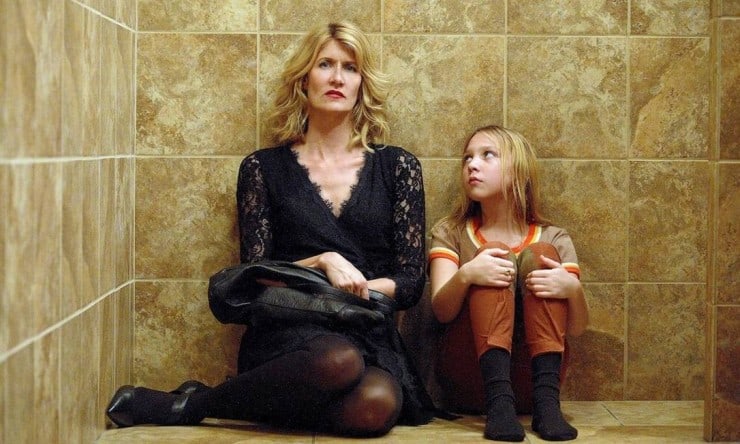
The Sundance favorite brings a harrowing story out of the shadows.
Two-thirds of the way through HBO’s latest original film, Sundance standout The Tale, I had to take a break. I’d originally planned to cry, but instead I surprised myself by messaging my childhood best friend, asking her–much like Laura Dern’s character does with her former summer camp peers in the film–questions that were over a decade old but, if my shaking hands were any indication, still capable of pushing my body into a fight-or-flight response.
It is a privilege to demand or even imagine such a thing as an unbiased review, a reading of art that’s entirely divorced from one’s own unignorable experiences. In a nation where one in nine girls will become a victim of sexual abuse–and even the most spoiler-averse among our readers need to know that child rape is unflinchingly, prominently featured in The Tale–an interpretation of this challenging, singular film that was perfectly uninvolved would be rare-to-nonexistent, if it were even necessary at all. So that’s not what this is.
Unlike filmmaker Jennifer Fox–who courageously put her own name on The Tale’s protagonist, destroying any idea that this story is not true–I was never raped as a child. I did, however, find myself in a murky situation under the care of an adult male authority figure who I believe did not have my best intentions at heart, and who later left his position after murmurs of inappropriate incidents with multiple young girls, including me. When adults questioned me about my relationship with this man–I was around ten at the time, new to double digits–I was confused, scared, inexplicably guilty, and resoundingly naive about the complex nature of adult intentions.
That Molotov cocktail of immature, troublesome emotion is where The Tale lives. When documentarian Jenn (Laura Dern) receives an urgent package from her mother (Ellen Burstyn) containing a copy of a short story she wrote as a teen, her past and present start to bleed together in startling ways. Memories of her younger self and two predatory adults (Jason Ritter and a captivating Elizabeth Debicki) flicker, change and even turn to address her–with characters often seated and facing the camera like some twisted reality show confessional–directly across time. Isabelle Nélisse plays Jennifer’s teen self with gutting precision: she’s a smart, often overlooked girl who becomes increasingly anxious in the face of her abuse. With a different subject and a lesser cast, Fox’s narrative devices would feel gimmicky–adult Jennifer’s investigation into her own past could have easily turned into a colorless, Nocturnal Animals-style framing device–but for a story like Jenn’s, they’re not just integral, but radical.

The Tale’s press description notes that it explores “the stories we tell ourselves in order to survive,” and the myth-making conceptualization of the film is appropriate. Fox’s documentary filmmaking background might lead to The Tale’s only shortcoming, but as she grapples with a story that tackles the complexity of subjective narrative, it’s also the film’s greatest strength. On the one hand, a few modern-day pieces of the puzzle come across as underwritten: Jennifer’s fiance Martin (Common) is under-utilized and seems to be present mostly just for accuracy’s sake. On the other, never has the insidious malleability of female memory been explored so thoroughly and with such brutal honesty as in Fox’s narrative debut.
Dern stuns as a woman whose life is upended by the recovery of a traumatic chapter of her own history, but Fox’s indelible script and creative direction are what make the movie a standout. A scene during which Jenny’s running coach (Jason Ritter) corners her on a sofa initially appears comfortable, complete with a flickering fireplace. As Dern’s Jennifer dives further into the memory, a moment she recognizes as a transition from feigned platonic interactions to overtly sexual ones, it shifts disturbingly; now the room is dark, and the fireplace is cold and empty. These memory glitches happen again and again and clearly exist not for the sake of their visual style (horror movies often use similar techniques as a means to sensational ends), but as authentic psychological underpinnings that get at the shadowy heart of repressed trauma, the very fabric of the tale itself.
Much of Jennifer’s tale will feel shockingly familiar to those who have been placed in similarly adult situations as children. For one, Jennifer is groomed by her abusers, made to feel so special and mature that it takes her decades to understand that what she felt was not love, but manipulation. Scenes of perversions disguised by their perpetrators as respect and open-mindedness are at once gripping and nearly unwatchable. By the end, The Tale’s painstaking accuracy has thrown all other imitators into sharp relief. Since the inception of visual storytelling, countless on-screen narratives surrounding sexual abuse (particularly abuse toward women) have been created for, by, and on some level even about people who have not experienced it. Fox’s film takes a story that so many people push away into the deepest recesses of their hearts, never even telling it in whispers, and shouts it–boldly and bravely and in all its queasy detail–at the top of her lungs.
Early in the movie, Jennifer mis-remembers herself, picturing an older teen when she first envisions the summer that stole so much from her. After she looks at a family photo album and realizes she was wrong, the replayed memory–featuring Nélisse, a small, clearly pre-pubescent girl–is one of the most jarring, viscerally disturbing gut-checks in the film. The truth Fox makes most plain is this: however else abusers take from us, they also take our memories, our agency over what we once understood as immutable fact. They force us to create tales about ourselves, replete with gaps and mistakes and self-preserving lies. But like any great documentarian, Jennifer Fox–both on the screen and behind it–takes the story she’s given and spins it into something vital. The Tale might be tough to watch, but it’s also filmmaking at its most important: honest and brave, complicated and cathartic.
Related Topics: HBO, jennifer fox, Laura Dern, The Tale

